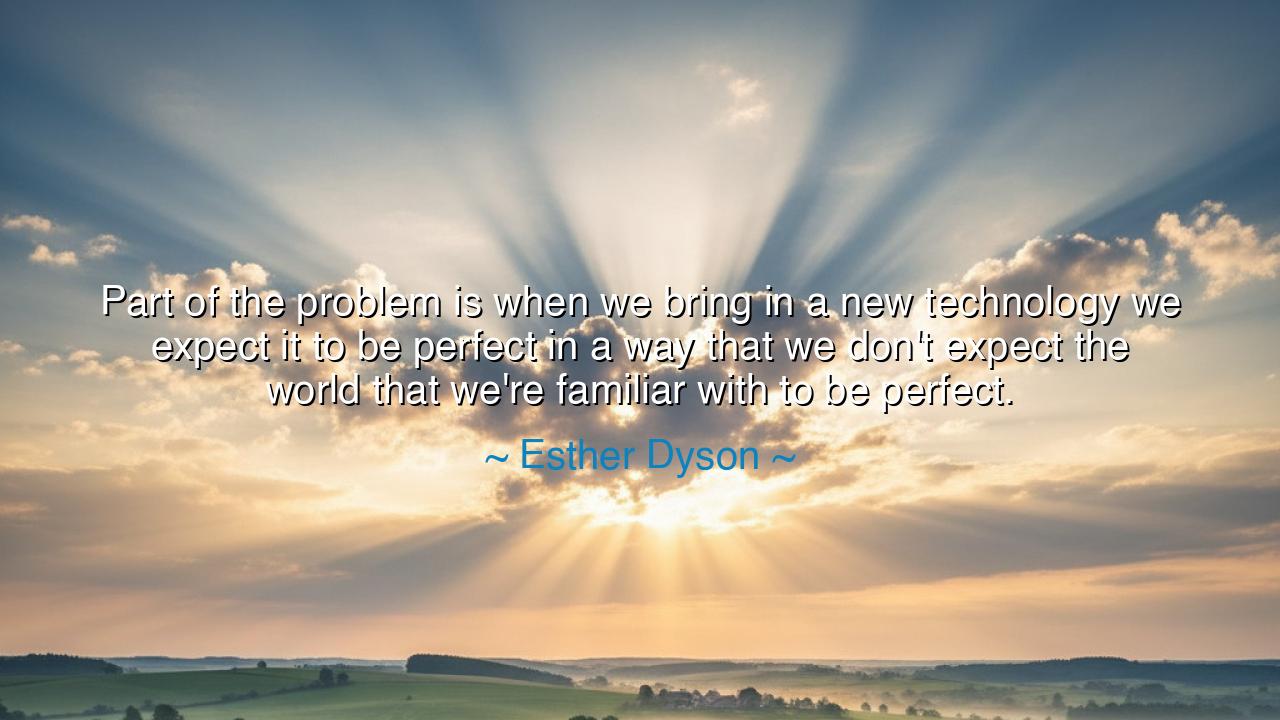
Part of the problem is when we bring in a new technology we
Part of the problem is when we bring in a new technology we expect it to be perfect in a way that we don't expect the world that we're familiar with to be perfect.






Hear now, O seekers of wisdom, the words of Esther Dyson, who declared: “Part of the problem is when we bring in a new technology we expect it to be perfect in a way that we don’t expect the world that we’re familiar with to be perfect.” This saying is a lamp for the restless mind, for it reminds us of the danger not in the tools themselves, but in the expectations we lay upon them. For we, in our yearning, demand that what is fresh and untested should be flawless, while forgiving the cracks and scars of the world already known. Dyson’s words warn us: perfection is an illusion, and to demand it from our creations is to blind ourselves to their true worth.
Consider, O children of tomorrow, how the ancients themselves once faced this same folly. When the first printing press spread across Europe, men cried both marvel and outrage. The scribes who once copied sacred texts by hand looked upon the new machine and found its errors intolerable—misprints, smudges, pages flawed. Yet, in time, they forgot that their own hand-written scrolls too carried mistakes, uneven lines, and faded ink. The press, though imperfect, multiplied knowledge beyond imagination, igniting revolutions of thought and faith. What seemed at first a flawed tool became a pillar of enlightenment.
So too it has been with the airplane, that great chariot of the sky. When the Wright brothers first lifted into the wind, their creation trembled, wavered, and seemed fragile compared to the soaring birds of nature. Many mocked them, saying flight by man was unnatural. Yet, those frail wings became the foundation of voyages that bind continents together. We forgot, in our impatience, that even the eagle stumbles as a hatchling before it rules the sky. So must our new technologies be given time to stumble, to falter, to grow strong.
Dyson’s wisdom strikes at the heart of our impatience. Why do we demand of the new what we forgive in the old? Our roads are cracked, our governments flawed, our friendships filled with error, and yet we live on. But when a fresh device or invention arrives, we cry betrayal at the first sign of weakness, as though it were meant to be born complete, without struggle, without the slow perfection of time. In this, we forget that technology, like humankind itself, is born imperfect and grows through trial.
This is not a counsel to accept failure without effort, nor to excuse the harm that carelessness may cause. Rather, it is a teaching of patience and perspective. We must learn to embrace the journey of progress, to see each flaw not as the sign of doom, but as the sign of birth. Just as a child’s first steps are wobbly and yet wondrous, so too are the early stages of every new creation. If we cast them aside at their first stumble, we deny ourselves the marvels they may one day bring.
Therefore, O listeners, the lesson is this: temper your expectations with mercy. When you encounter the new, do not demand of it perfection, but nurture it as you would a seedling. Ask not only, “Is it flawless?” but also, “Can it grow?” In your own life, when you take up unfamiliar paths, new skills, or untested dreams, remember that your first efforts will falter. Do not condemn yourself for imperfection, for you are no different than the works of your hands.
Practical actions flow from this truth: welcome the new technologies of your age with curiosity, not cynicism; measure their worth not only by their errors, but by their potential. When you fail in your own endeavors, remind yourself that the world you trust is full of cracks and yet still carries you. Show the same grace to your tools, to your peers, and to yourself. In doing so, you will not be chained by disappointment, but carried forward by hope.
Thus do Dyson’s words endure: the problem is not in the new, but in the shadow of our demands. Let us not chain progress with the weight of impossible perfection, but instead lift it with patience, faith, and the wisdom that all greatness begins flawed. In this way, both technology and the human spirit shall grow side by side, shaping a future worthy of our descendants.






AAdministratorAdministrator
Welcome, honored guests. Please leave a comment, we will respond soon